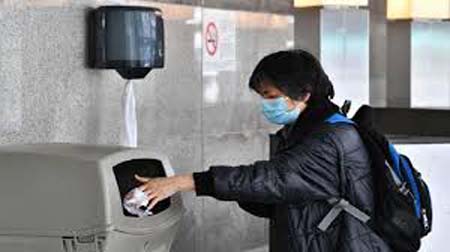
PARIS: People should dry their hands with paper towels to avoid spreading the new coronavirus, according to the authors of a study published on Friday that finds disposable tissues are better than jet dryers at removing pathogens missed by ineffective washing. Global health authorities have highlighted the crucial importance of washing hands with soap and water to protect against COVID-19, which has killed tens of thousands and spread around the world.
Contaminated hands are a major route for germ transmission, potentially spreading pathogens to surfaces - like door handles or taps - and causing infection when people touch their faces. A small study by experts from Britain's University of Leeds and Leeds Teaching Hospitals NHS Trust found that if hands had not been properly washed, drying with a paper towel was more effective at removing microbes.
"We believe that our results are relevant to the control of the novel coronavirus that is spreading at pace worldwide," said the authors, led by Ines Moura from the University of Leeds. "Paper towels should be the preferred way to dry hands after washing and so reduce the risk of virus contamination and spread."
Four volunteers had their hands contaminated using a bacteriophage - a virus that infects bacteria and is harmless to humans - and then did not attempt to wash the microbes away. They then dried their hands either with paper towels or a jet air dryer in a hospital toilet and went on to touch various surfaces including door handles, stair rails, phones and stethoscopes. Researchers found that using both paper towels and jet dryers reduced the contamination on hands.
But for 10 out of 11 surfaces sampled, the jet method left "significantly greater environmental contamination". Microbes were found on all surfaces touched after using the jet dryer, with contamination on average 10 times higher than after the use of paper towels. The authors said the study was particularly relevant for hospital settings.
They noted that while the NHS and World Health Organization (WHO) recommend the use of disposable towels after hand-washing - as well as using them to turn off taps - healthcare facilities in the UK were increasingly using jet dryers. "Clearly how much virus remains on peoples' hands after washing depends to a large extent on how efficiently people are at washing their own hands," said Paul Hunter, professor in medicine at the University of East Anglia, in response to the research.
"If people do not wash their hands properly then other people may be at risk if standing close to someone using such a jet dryer. This study reinforces the need to wash hands properly so as much virus is removed as possible before drying." The study was due to be presented at this year's European Congress on Clinical Microbiology and Infectious Diseases (ECCMID) in Paris this month, which was itself cancelled due to the coronavirus pandemic.
Meanwhile, the experimental antiviral drug remdesivir has proven effective against COVID-19 in a small experiment involving monkeys, US government scientists reported Friday. The study, which is preliminary and has not yet been peer reviewed, was designed to follow dosing and treatment procedures used for hospitalized COVID-19 patients in a large human trial. It involved two groups of six rhesus macaques that were deliberately infected with SARS-CoV-2.
One group received the drug, which was developed by Gilead Sciences, and the other group did not. The group receiving the drug got their first intravenous dose 12 hours after infection then every day subsequently for six days. The scientists timed the initial treatment to occur shortly before the virus reached its highest levels in the animals' lungs. The treated animals showed significant improvement 12 hours after their first dose, a trend that continued over the week-long study.
One of the six treated animals showed mild breathing difficulty, while all six of the untreated monkeys had rapid and difficult breathing. The amount of virus found in the lungs was significantly lower in the treated group compared to the untreated group. The treated group also had less lung damage. Remdesivir was among the first drugs mooted as a treatment for the novel coronavirus and its randomized clinical trials are at an advanced stage.
The health news website Stat on Thursday reported the drug had shown great efficacy at a Chicago hospital where patients who are part of those trials are being treated. Remdesivir causes the virus to add mutations that can destroy it. - Agencies









